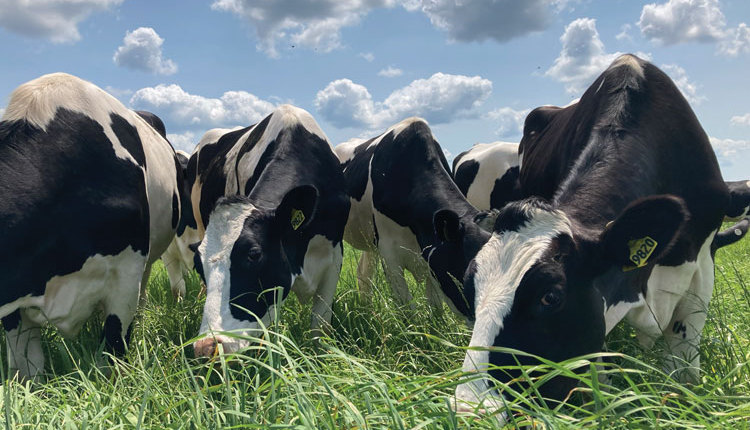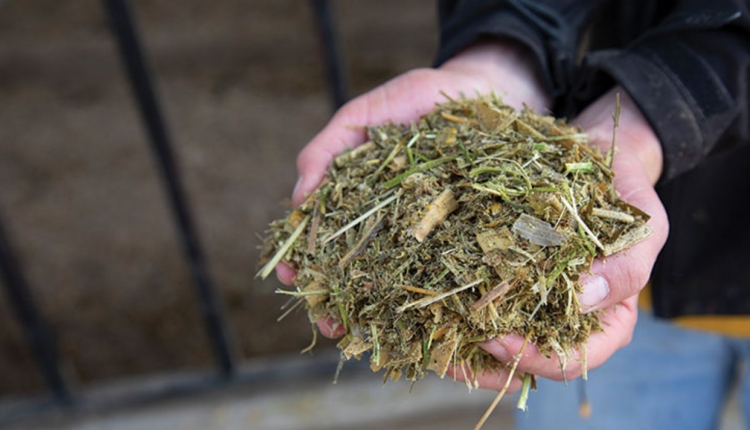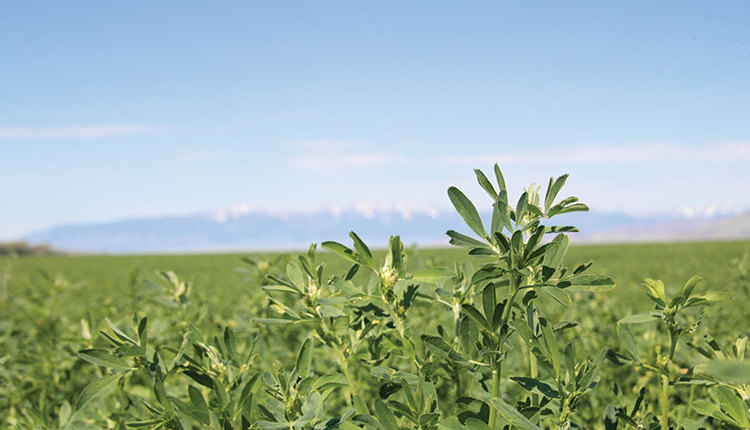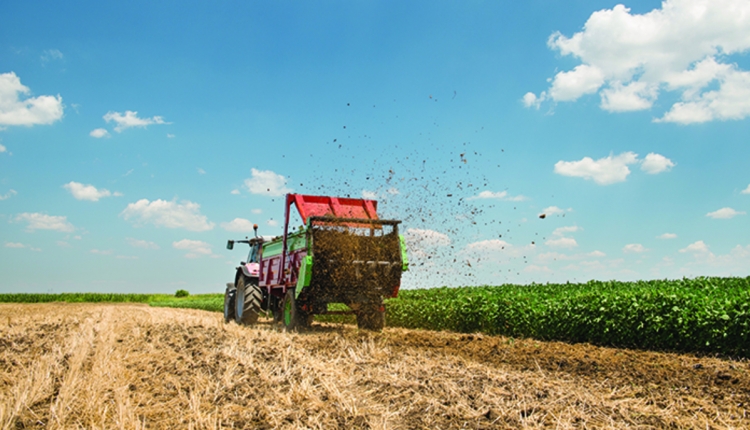The author is the senior nutrient management educator for Michigan State University Extension. For more information, visit www.animalagteam.msu.edu
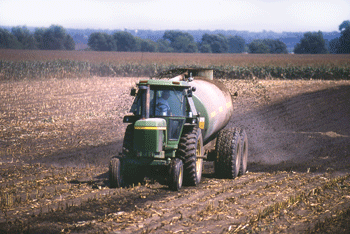
Utilizing manure as a fertilizer to its full potential is a concept that has made cents and sense for well over 100 years.
The statement, "One of the important functions of farm manure is to convey back to the soil, in a readily available form, the majority of the plant food removed from it by crops." was taken from Farm Manures by A. H. Snyder. It was the first Extension bulletin published at Iowa State College (now ISU) in October 1907.
It is interesting that the first Extension bulletin in Iowa focused on manure. Even more interesting is how much researchers knew about manure 103 years ago. It makes you wonder how much further along we'd be with manure management today if we would have held onto the basic premise of the synergism of crops and livestock.
The bulletin begins with a concern that a quarter of the crop in Iowa was leaving the farm and, therefore, it would never be recycled (as fodder, bedding, or manure) back to the soil. He feared this would result in lower soil quality. Snyder made a strong social statement when he wrote, "If anyone has the least doubt as to the necessity of adopting proper methods in the treatment of his soil, he need only consider the history of the older states a little farther east. He will see that the march of commercial fertilizers has advanced westward until they now have a strong foothold in Illinois . . . and are knocking at the door of our own state. It is high time for the land owner of Iowa to decide whether he will adopt such methods of farming as will permit returning to the soil a large percentage of the plant food removed by crops, or whether he, like his brother farther east, will rob his soil by wasteful and haphazard methods, until it is no longer a question of maintaining, but rather a question of acquiring or building up fertility."
Most of us in agriculture probably wouldn't be quite so hard on commercial fertilizer, and we certainly acknowledge the advances in feeding the world it has provided, but is there some merit in balancing soil fertility with something as natural as manure?
The areas in the United States that have the largest issues with manure management are those where the land base to raise the crops to feed the animals has vanished. States that have the land base struggle with social and environmental pressures to land apply manure while feeling pressured to use expensive technical fixes that keep it out of sight and smelling distance. Regardless of Snyder's social and political motives, he supports his ideas with data on profitable handling, storing, and manure nutrient utilization. The ol' pocketbook is the cord that still rings true to the heart of everyone, including farmers.
The bulletin never uses the word sustainability, but a combination of livestock and cropping systems was valued to achieve a nutrient balance and a profitable family farm. Although farms have specialized like every other business, sustainability can be found in a neighborhood where crop and livestock producers share resources.
The value of manure for its nutrient and soil-enhancing qualities was front and center of farmers' minds in 1907. Though the bulletin does not talk about environment protection, it strongly states that losing nutrients should be avoided at all costs.
"When manure is allowed to accumulate, it is always important that proper precautions be taken to prevent loss by leaching and fermentation. It should never be piled under the eaves of a building, nor on a slope where surface washing will be great. When possible, it should either be sheltered from rain by some sort of shed or placed in a water-tight pit, so that the water which falls upon it cannot leach away the most valuable portion of the manure."
The bulletin goes on to quote research that shows the amount of nutrients, dollar value of those nutrients, and yield impacts that can be lost from crop production by "haphazard methods of collection, preservation, and utilization of manure." Still timely advice 103 years later.
There is no silver bullet for areas that just do not have the land base to agronomically apply manure, but there are options. For farmers who live in neighborhoods where there is the land base - whether they own the land or not - seeking partnerships will ensure sustainability. If you rely on purchased fertilizer, would you consider working with, or even encouraging a new livestock farm in your neighborhood for long-term sustainability?
For livestock producers, manure is an expensive issue. Maximizing manure nutrients by returning them to the land is financially imperative.
For those with a small land base, your soil tests may show that phosphorus fertilizer is not necessary. Are you still buying it? Are you telling yourself that it is needed because you plant early and the soil is cold and/or you no-till? Can you really afford purchasing phosphorus starter fertilizers agronomically and financially? Or are you waiting for social and regulatory pressure to persuade you?
Snyder continued, "The results of numerous experiments show that one of the most important roles which manure plays is that of rendering available the native plant food of the soil. While it has been demonstrated beyond reasonable doubt that this is true, it is, nevertheless, not as thoroughly understood how it is accomplished." Nor is it thoroughly understood today.
Link: To find the full bulletin, visit http://bit.ly/ISUManure.
Get the most from manure nutrients
Want to make sure you're getting the biggest bang for your manure buck? Follow these simple tips:
• Take soil tests, and follow the recommendation they unveil.
• When fertilizer is not called for, research has proven time and again it will not consistently or profitably add to yields.
• Trust in manure nutrients, and learn how to maximize your system to recycle and retain the most nitrogen.
• Find ways to haul manure to fields farther away that do need the P and K, and reduce fertilizer accordingly.
• Swap land with your neighbor when their land is closer than your own to haul manure.
• Be sure soil pH and compaction are corrected to allow all nutrients to work for the crop.
Above all, credit the manure nutrients first, using fertilizer only when there is a proven shortage in the soil. Be sure your agronomist provides you with a copy of the soil test results, not just the recommendations. It's your land, your money, and your future.
Click here to return to the Crops & Forages E-Sources
100325_210

Utilizing manure as a fertilizer to its full potential is a concept that has made cents and sense for well over 100 years.
The statement, "One of the important functions of farm manure is to convey back to the soil, in a readily available form, the majority of the plant food removed from it by crops." was taken from Farm Manures by A. H. Snyder. It was the first Extension bulletin published at Iowa State College (now ISU) in October 1907.
It is interesting that the first Extension bulletin in Iowa focused on manure. Even more interesting is how much researchers knew about manure 103 years ago. It makes you wonder how much further along we'd be with manure management today if we would have held onto the basic premise of the synergism of crops and livestock.
The bulletin begins with a concern that a quarter of the crop in Iowa was leaving the farm and, therefore, it would never be recycled (as fodder, bedding, or manure) back to the soil. He feared this would result in lower soil quality. Snyder made a strong social statement when he wrote, "If anyone has the least doubt as to the necessity of adopting proper methods in the treatment of his soil, he need only consider the history of the older states a little farther east. He will see that the march of commercial fertilizers has advanced westward until they now have a strong foothold in Illinois . . . and are knocking at the door of our own state. It is high time for the land owner of Iowa to decide whether he will adopt such methods of farming as will permit returning to the soil a large percentage of the plant food removed by crops, or whether he, like his brother farther east, will rob his soil by wasteful and haphazard methods, until it is no longer a question of maintaining, but rather a question of acquiring or building up fertility."
Most of us in agriculture probably wouldn't be quite so hard on commercial fertilizer, and we certainly acknowledge the advances in feeding the world it has provided, but is there some merit in balancing soil fertility with something as natural as manure?
Still need the land base
The areas in the United States that have the largest issues with manure management are those where the land base to raise the crops to feed the animals has vanished. States that have the land base struggle with social and environmental pressures to land apply manure while feeling pressured to use expensive technical fixes that keep it out of sight and smelling distance. Regardless of Snyder's social and political motives, he supports his ideas with data on profitable handling, storing, and manure nutrient utilization. The ol' pocketbook is the cord that still rings true to the heart of everyone, including farmers.
The bulletin never uses the word sustainability, but a combination of livestock and cropping systems was valued to achieve a nutrient balance and a profitable family farm. Although farms have specialized like every other business, sustainability can be found in a neighborhood where crop and livestock producers share resources.
The value of manure for its nutrient and soil-enhancing qualities was front and center of farmers' minds in 1907. Though the bulletin does not talk about environment protection, it strongly states that losing nutrients should be avoided at all costs.
"When manure is allowed to accumulate, it is always important that proper precautions be taken to prevent loss by leaching and fermentation. It should never be piled under the eaves of a building, nor on a slope where surface washing will be great. When possible, it should either be sheltered from rain by some sort of shed or placed in a water-tight pit, so that the water which falls upon it cannot leach away the most valuable portion of the manure."
The bulletin goes on to quote research that shows the amount of nutrients, dollar value of those nutrients, and yield impacts that can be lost from crop production by "haphazard methods of collection, preservation, and utilization of manure." Still timely advice 103 years later.
Not one answer
There is no silver bullet for areas that just do not have the land base to agronomically apply manure, but there are options. For farmers who live in neighborhoods where there is the land base - whether they own the land or not - seeking partnerships will ensure sustainability. If you rely on purchased fertilizer, would you consider working with, or even encouraging a new livestock farm in your neighborhood for long-term sustainability?
For livestock producers, manure is an expensive issue. Maximizing manure nutrients by returning them to the land is financially imperative.
For those with a small land base, your soil tests may show that phosphorus fertilizer is not necessary. Are you still buying it? Are you telling yourself that it is needed because you plant early and the soil is cold and/or you no-till? Can you really afford purchasing phosphorus starter fertilizers agronomically and financially? Or are you waiting for social and regulatory pressure to persuade you?
Snyder continued, "The results of numerous experiments show that one of the most important roles which manure plays is that of rendering available the native plant food of the soil. While it has been demonstrated beyond reasonable doubt that this is true, it is, nevertheless, not as thoroughly understood how it is accomplished." Nor is it thoroughly understood today.
Link: To find the full bulletin, visit http://bit.ly/ISUManure.
Get the most from manure nutrients
Want to make sure you're getting the biggest bang for your manure buck? Follow these simple tips:
• Take soil tests, and follow the recommendation they unveil.
• When fertilizer is not called for, research has proven time and again it will not consistently or profitably add to yields.
• Trust in manure nutrients, and learn how to maximize your system to recycle and retain the most nitrogen.
• Find ways to haul manure to fields farther away that do need the P and K, and reduce fertilizer accordingly.
• Swap land with your neighbor when their land is closer than your own to haul manure.
• Be sure soil pH and compaction are corrected to allow all nutrients to work for the crop.
Above all, credit the manure nutrients first, using fertilizer only when there is a proven shortage in the soil. Be sure your agronomist provides you with a copy of the soil test results, not just the recommendations. It's your land, your money, and your future.
100325_210






